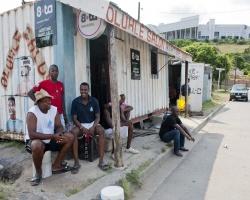Shining Examples Needed in a Dark Township
With its castle-like architecture and high security, the Pavilion looms on top of a hill in stark contrast to the poor, crime-ridden township of Chesterville below.
Durban’s second largest mall serves as a physical reminder that in South Africa there are definitely the haves and the have-nots—and not much in between.
While the Pavilion represents indulgence in a wealthy lifestyle with its high-brow shops, restaurants, movie theaters and skate park, Chesterville’s makeshift shacks, government-built housing and littered streets filled with idle people testify to the poverty and high unemployment rate.
Townships such as Chesterville are impoverished neighborhoods populated by black (in Durban, mainly Zulus), colored (a non-offensive South African term for mixed-race people) and Asians. They still exist from South Africa’s former apartheid policy of racial segregation. Nonwhites, the majority of the population, typically live in townships; and the small percentage of whites live in upscale, secure suburbs.
All the laws of apartheid were abolished by 1994 when Nelson Mandela became the first South African president to be elected in a fully representative democratic election. However, the socioeconomic and cultural issues related to unjust treatment and massive segregation—crime, unemployment, lack of education, sexual abuse, HIV/AIDS, alcoholism and drugs—still shape the country today.
“Chesterville is a wicked place,” admits Lifa, 27, who should know—he grew up there.
Lifa has witnessed some of the worst of township life. He remembers seeing apartheid-related violence as a child; that’s how his own father was killed. Lifa’s group of friends was involved in too much drinking and fighting as young men; and in his early 20s, he was shot through the left shoulder by a disgruntled friend to whom he owed money.
Many Chesterville residents attribute much of the violence in townships to wunga, a new highly addictive drug that recently has skyrocketed in use. Wunga is a combination of rat poison, ARVs (antiretroviral drugs), powdered detergent and marijuana or heroin. Because so many are unemployed, addicts who can’t afford their next fix steal money to buy the drug or steal ARVs from AIDS patients.
According to United Nations AIDS information, South Africa has the world’s largest HIV epidemic with an estimated 5.6 million HIV-positive people. The country’s HIV prevalence is at 17.8 percent—with some sources estimating more than 30 percent in the townships. However, “in the township, nobody talks about (HIV/AIDS)—I mean nobody,” Lifa said, because when someone reveals he or she is HIV-positive, gossip spreads like wildfire and the person is judged and ostracized.
At 23, Patrick’s life hasn’t been filled with as much violence as Lifa’s, but it still has been difficult.
Patrick’s father left while his mother was pregnant with him and his twin brother. He never has met him. When Patrick was a toddler, his mother and brother became ill with an unknown disease and died. He was sent to live with family for a few months, but then was placed in a government home.
When Patrick was 8, he was placed in a foster home with a loving, supportive foster mother—the first parent he ever really had known—but his anger and pain kept him from performing well in school and making close friends.
When Patrick attended a life-skills course offered by a local ministry, he was forced to take a good, hard look at himself; and he realized he needed to release the anger and pain that had been defining him. Patrick became a follower of Jesus Christ in 2011 and now is serving in the same local ministry that changed his life, teaching life skills to youth and others in Chesterville.
“Working with other people who had the same condition or history as me, I think it will help even when speaking to them…because it’s not only me who had a horrible past,” he said.
Patrick and Lifa see the need for change in Chesterville: better education to learn job skills; more development such as supermarkets, banks and restaurants to provide more jobs; better upkeep of public parks and soccer fields so youth will have recreational outlets; but the hope of Jesus is the thing Chesterville needs most, Patrick said.
“If they’ve got a personal relationship with Christ, I think they will stop doing these bad things, because to be a follower of Christ…the lifestyle needs to change,” he said. “Right now, they do drugs because they don’t care about people; they steal because they don’t care about people; but Christianity teaches about love and care for others.”
To find out how one student’s life can make a difference in one neighborhood such as Chesterville, visit OneLifeMatters.org.




